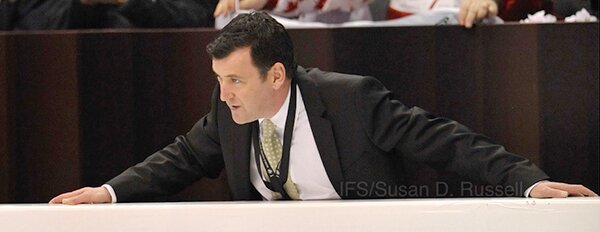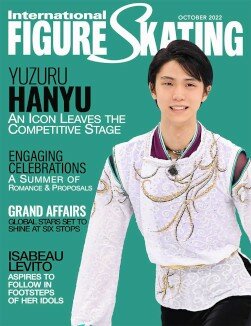

As a former World and Olympic level competitor, Brian Orser had one of the most successful careers in skating history. Having coached three individual skaters to two Olympic and three World titles in six years, he knows a few things about preparing skaters for competitions.
I sat down with him to talk about the strategies he used as a competitor and how he applies that knowledge to the skaters he works with.
VISUALIZING SUCCESS
One of the most important elements of a competitive athlete’s regimen is a sound sleep. Orser recalled that, during the early years of his career, the nights before a competition were usually stressful and sleep challenged.
“I often had trouble sleeping. I would lie in bed and visualize my jumps, often missing them. Then, I would have to stay awake and try to visualize the right technique,” he recalled. “So, I was stressed and tired before I even got to the event, and that negativity would sometimes creep into my performances.”
In 1986, his coach, Doug Leigh, enlisted the help of Peter Jensen, a Canadian sports psychologist and an expert in relaxation techniques, to work with Orser. “Using a sports psychologist was unheard of back then. Peter is an expert in the use of hypnosis and visualization techniques and creating meditative-type states of mind to relax you,” Orser explained.
“Over time, Peter taught me how to use those meditative visualizations to my advantage, especially in the evenings before going to sleep. His method allowed me to relax and see myself competing with great jumps in clean, well-executed programs. But most of all, it released all the stress and allowed me to get a restful and good night’s sleep. The next day, this positive visualization made its way into my programs on the ice.”
During the almost two decades that Orser toured as a professional, hypnosis and visualization played no role in his life, but that all changed in 2006, when he transitioned into coaching.
Orser wanted all of his students to own the visualization-and-relaxation concept and started talking to them about the successful techniques he had learned from Jensen. In 2010, Orser produced CDs for his students as a way to help them practice those techniques.
Then, quite by chance, he connected with Asad Mecci, a successful motivational coach and respected hypnotist. They collaborated on a concept and, in 2013, developed the Peak Performance app, which, among other things, embraces the techniques that proved so successful for Orser. More than 700 skaters throughout the world now use this app as a training tool.
PREPARATION PAYS OFF
Set procedures are in place for every skater at every level who trains at the Toronto Cricket Club. These include planning a season in advance, setting a training regimen, and increasing the number of clean program run-throughs that each skater must do as the season progresses.
“I expect all our skaters who are training for competitions to be ready and prepared to do run-throughs, and I want those run-throughs to be clean,” Orser said.
His students are also required to participate in mock competitions that take place before live audiences at various rinks around Toronto. “As we get closer to competitions, we hold simulations. Before we leave for them, we do a draw. We have judges and technical specialists and a 6-minute warm-up. After the events, their programs are critiqued, and we learn what will make things better,” Orser explained.
He and the other coaches have nurtured a team-building mentality in the skaters they train, Orser said. “The younger kids are brought up to respect the elite skaters, and they can sense the tension before a big event. At the same time, when those younger skaters are running through their programs, preparing for a competition, they get the same respect from the coaches and elite skaters.
“Everyone is treated with dignity and kindness, which creates this amazing sense of team-building.”
KNOWING YOUR SKATER
When it comes to competitions, Orser said, it is important to keep things as normal as possible. He described his routine on event days as being that of a “normal competition coach.”
“My skaters expect me to do certain things, such as wear a suit, create a schedule for the day, attend the draw with them, and specifically prepare for the time after the 6-minute warm-up,” he said. “I just stay calm and be my normal self. I don’t try to be funny or engage my skaters in excessive dialogue to distract them. Less talk is better.
“It’s important to be selective with my words, and I literally rehearse the phrases I will use with my skaters before I go to the rink, so I don’t blurt out the wrong thing. I might say something like, ‘You look like you had a good rest.’
“Coaches, including myself, should never ‘awfulize’ the process by saying things like, ‘Are you ready?’ or ‘How are you feeling?’ These types of questions get the skater thinking: ‘Am I ready?’ or ‘Maybe I am feeling nervous.’”
Orser said that it is more important to let his more experienced athletes take charge of their preparation at a competition. “My skaters decide when it’s time to go to the locker room and when it is time to go to and leave the ice. I never say, ‘I’s time to go; get ready.’ I keep it calm. I continue to follow the skater’s lead while carefully monitoring their body language. “After the 6-minute warm-up, we manage the time according to the starting order. For example, if they are the last to skate in their group, it might be 30 minutes until they skate. I always bring their shoes so they can take off their boots for a bit. I don’t work hard at having small talk. I just let them settle, but I am there for them.
“Again, I follow each skater’s lead as to when they are ready to walk through the first half of the program. We chill for a few minutes and then walk through the second half. Elite skaters like having a plan for the time between the 6-minute warm-up and when it is time for them to take the ice. We find a quiet spot to wait but never hide far away from the ice. It’s a part of life to hear an ovation for another skater or to hear that there may have been some difficulties.
“When I was competing, I would sometimes hide in a locker room and turn on the shower to block out the noise. That was me being fearful. This isolation caused some negative energy to come back to me when I went out to the ice. I learned that it is better to just stay in the zone and not let your guard down. Just stay with the plan and remain connected.”
Orser said it is important to know your skater’s habits at a competition. “My coaching team and I always find it interesting to note the specifics that our skaters bring to competition.
“For example, we learned that Javi (Fernández) likes to briefly suck on a lemon slice before he takes to the ice. Sometimes our team finds itself texting each other asking, ‘Who has the freaking lemon slices?’ We try to be there for our skaters in every way that we can.”
Orser’s best advice for skaters who are preparing for competitions is to trust their training. “Skaters should count their average of successful run-throughs of programs and not let one bad run-through affect what they are trained to do when it comes to a competition.”
Merry Neitlich is the director of the Coach’s Edge and can be reached at merry@coachsedge.biz.




